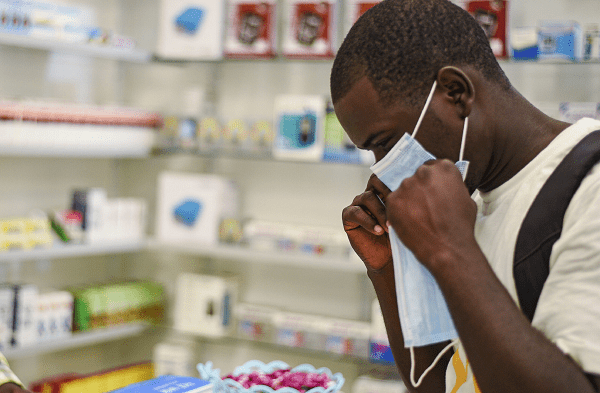
Wrong use of mask gives no protection — Dr Aboagye
The Director of Health Promotion at the Ghana Health Service, Dr Dacosta Aboagye, has cautioned the public against the improper use and disposal of nose masks.
He said while the use of nose masks had become a preventive measure against COVID-19, “nose masks must be worn correctly, changed frequently, removed properly, disposed of safely and used in combination with good universal hygiene behaviour in order for them to be effective.”
Dr Aboagye made the assertion in an interview with the Daily Graphic in Accra yesterday. He said if used wrongly, nose masks could prove to be counterproductive.
He was concerned that even though people had heard about the nose mask and had resorted to its use, regrettably, not much attention was paid to the correct use of the protective item, thereby increasing their possibility of becoming exposed to the disease.
Wrong uses
He said some of the wrong ways of using a nose mask included touching it intermittedly while it was on one’s face and the mask not fitting as tightly as it was supposed to be.
Besides, some people often dropped the mask to the chin or left it hanging around the neck while they took some moments of relief.
Dr Aboagye said any wrong use of the nose mask increased one’s vulnerability and defeated the objective for which the mask was put on in the first place since the virus was transmitted through droplets from coughs and sneezes of infected persons and on few occasions from droplets when talking.
The GHS Health Promotion Director said droplets from coughs, sneezes and infected persons while they talked, settled directly either on one’s face, thus introducing the virus to the respiratory system through the mouth, nose and eyes or by picking a virus that had come to rest on surfaces such as nose masks, tables, door handles and taps with the hand and introducing it to the respiratory system again by touching one’s face.
“Infection in many people is usually asymptomatic or pre-symptomatic and if they are wearing a nose mask, this can prevent droplets that carry the virus from escaping and infecting others,” he said.
However, he said the nose mask could also be worn when people found themselves in overcrowded places where potentially infected persons might be and where social distancing would be difficult to ensure as well as preventing droplets from coughs and sneezes from infected persons from landing on one’s face.
Right use
While applauding the public for their eagerness to protect themselves, Dr Aboagye maintained that the best way to protect oneself from COVID-19 and indeed any other viral infection such as flu was to stick to basic hygiene and social distancing.
“Frequently wash your hands for at least 20 seconds with soap under running water while ensuring that the palms and in between the fingers and nails are washed properly. Ensure to also wash up to a little above the wrist and avoid touching your face, especially your mouth, nose and eyes.
“In addition, sneeze or cough into your flexed elbow or tissue and dispose of it immediately. Also, stay home when you are sick and call for help and disinfect surfaces often,” he said.
Dr Aboagye further recommended the use of 70 per cent alcohol-based hand sanitisers and avoiding overcrowded places and shaking of hands.
Types of masks
Dr Aboagye said there were two types of face masks: the disposable surgical mask also called a medical mask which covers the lower face and maybe pleated and is cuplike or duckbill-shaped and there is N95, which is also cuplike and has a respirator and often has N95 embossed on it.
He said the N95 masks, also called disposable N95 respirators, are of a higher quality and allowed only filtered air to reach the person and also provided a high degree of protection against airborne pathogens and has the added ability, when worn properly, to block 95 per cent of airborne particles.
“The disposable surgical mask, also called ordinary mask, is helpful to some extent. People wearing them should not think they are 100 per cent protected. A lot of particles can penetrate them and when they get soaked they can become a conduit for viruses and bacteria to multiply,” he added.
Dr Aboagye said the difference between the surgical nose mask and the N95 masks lay in the size of their pores or in effect the size of particles that could - and more importantly - could not get through.
